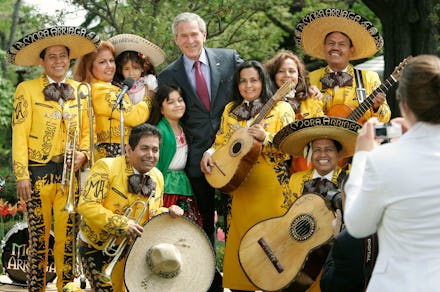A Short History of Cinco de Mayo for Everyone Who Still Thinks It's Mexican Independence Day

"Happy Mexican Independence Day!" sombrero-clad Americans will cheer Monday evening while clinking glasses full of blended strawberry-ritas over plates of nachos as mariachi music blasts in the background. Or maybe they realize that Cinco de Mayo is not, in fact, Mexico's independence day (that would be in September), and just want to take advantage of the excuse to drink tequila on a Monday. But the fact remains that when it comes to our neighbor to the south, we remain woefully ignorant.
For those revelers looking to impress their friends with a bit of history, Cinco de Mayo commemorates the Battle of Puebla. Around the mid-1800s, the Mexican government was bankrupt and stopped paying its foreign debts. France wasn't too pleased and invaded with the intent to capture Veracruz, Mexico's major port, and force the government to negotiate terms for the repayment of its debts. In 1862, a rag-tag Mexican force withstood the much larger and better equipped French army in the city of Puebla, just southeast of Mexico City. Shortly afterward, the French returned with a bigger army, captured Mexico City, installed an emperor and ruled the country for a few years. But we don't focus on that part.
Image Credit: Wikimedia Commons
For Puebla residents, Cinco de Mayo is a day to celebrate their city's battle to resist the yoke of imperialism. For other Mexicans around the country, it is a time when citizens of Puebla celebrate some battle and everyone else goes to work. For Mexican-Americans, it is a chance to recognize their heritage. For the rest of Americans, it's an excuse to drink Corona without fear of judgment.
But it's not just Mexican holidays that Americans get wrong. The Pew Research Center found that a scant 40% of American view Mexico favorably, significantly lower than the 60% who view Brazil in a positive light. Never mind the fact that Mexico is our third-largest oil supplier, or that our bilateral trade is seven times greater than that with Brazil, or that 6 million jobs in the United States depend on commerce across the Rio Grande, or that Mexico's foreign policy is much more closely aligned with ours than Brazil's.
Image Credit: AP. A Cinco de Mayo celebration in Los Angeles.
A recent poll by the firm Vianovo found that the word Americans most associate with Mexico is "drugs." "Dangerous," "crime," "violence" and "cartel" were also popular choices. The obvious irony here is that those drugs for which we fault Mexico are destined, by and large, for the United States. Moreover, the violence that has garnered so many headlines in the U.S. was in part spurred by a militarized offensive starting in the mid-2000s against the major cartels that counted on Washington's support.
No doubt, fears over undocumented immigration in the United States have also contributed to negative perceptions of Mexico. But here again, Americans miss the mark. One 2012 poll found that one-third of non-Latinos believed that more than half of Hispanics were undocumented. In reality, that figure stands closer to 15%. This ignorance regarding immigration has led some 60% of Americans to believe that Mexico is a source of problems for the United States. This majority may be surprised to learn that "every low-skilled, non-agricultural, temporary worker who comes to the U.S. to fill a job that may otherwise be left open creates an average of 4.64 U.S. jobs," or that "on average, immigrants, including the undocumented, pay nearly $1,800 more in taxes than they receive in benefits."
There are certainly plenty of reasons to celebrate this Cinco de Mayo, as America's relationship with Mexico has strengthened the U.S. economy and enriched our nation's culture. But given that some 10% of the U.S. population is of Mexican descent, our historical and cultural obliviousness is not only an indicator of how little we know our neighbor, it's increasingly a reflection of how little we know ourselves.